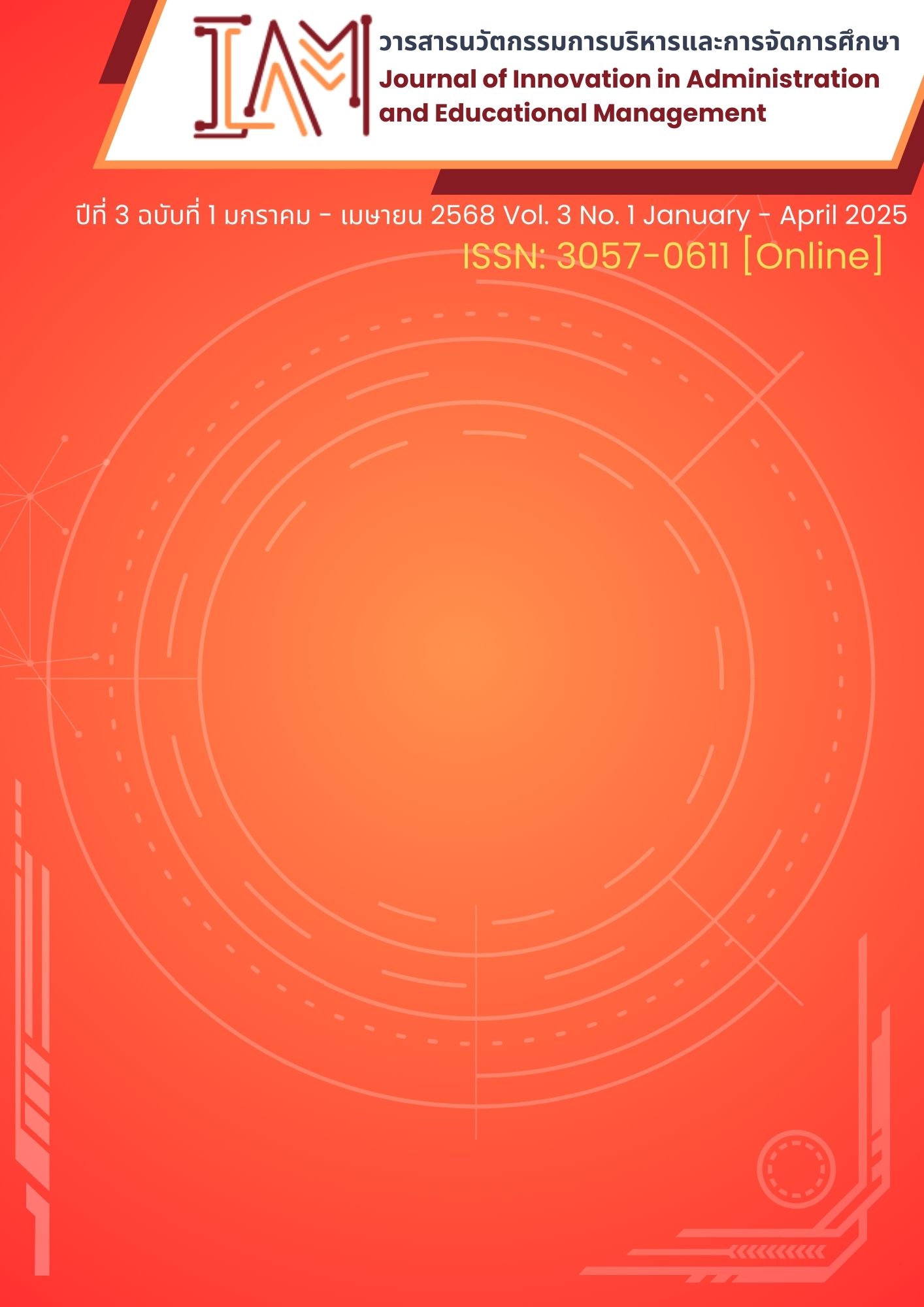A Process of Development Vocational Skills for Youth through the Collaboration with Universities and Community: Community of Ancient City of Kamphaeng Saen
Keywords:
Education, Youth Vocational Skills, Small Schools, Development NetworkAbstract
This research aimed to 1) study the challenges and needs in developing vocational skills for youth in the community of small schools, 2) develop a vocational skill development process plan for youth with the participation of the government, universities, and the community, and 3) examine the outcomes of the youth vocational skill development process. The study involved 20 participants selected purposefully from three groups: 1) school representatives, including one administrator, three teachers, one staff member, and five students; 2) university representatives, comprising four lecturers; and 3) community representatives, including one community leader and five parents. The research was conducted in two stages: 1) planning the development process, where stakeholders collaboratively designed a vocational skill development process for youth in small schools, and 2) evaluating the outcomes, involving 30 youth participants from the community who volunteered for the process. Quantitative data were collected through tests, skill measurement forms, and questionnaires, and analyzed using basic statistics and t-tests. Qualitative data were gathered via observation, interviews, and focus groups and analyzed using content analysis techniques. The findings revealed that: 1) small schools faced challenges such as limited budgets, insufficient educational equipment, and a shortage of teachers; 2) the developed vocational skill development plan consisted of two activities: 2.1) agricultural community resource analysis and 2.2) youth-led tourism initiatives; and 3) the outcomes of these activities showed that 3.1) youth achieved significantly higher post-activity scores at a 0.05 statistical level, 3.2) youth demonstrated the highest levels of group work skill performance, and 3.3) youth expressed the highest levels of satisfaction with the activities. Additionally, 4) reflections on the process highlighted its effectiveness in youth development, with suggestions for continued research.
Downloads
References
กรมกิจการเด็กและเยาวชน. (2567). รายงานแนวทางพัฒนาทักษะเยาวชนตามบริบทชุมชน. กรุงเทพมหานคร: กระทรวงพัฒนาสังคมและความมั่นคงของมนุษย์.
ชนิกา ศิริสุวรรณ. (2562). การวิเคราะห์ปัญหาทรัพยากรบุคลากรในโรงเรียนขนาดเล็กในชนบท. นครปฐม: มหาวิทยาลัยศิลปากร.
สันติ ศรีสวนแตง. (2556). การจัดการเรียนรู้โดยใช้สวนเกษตรเป็นฐาน. นครปฐม: เพชรเกษม พริ้นติ้ง กรุ๊ป จำกัด.
สุมิตร สุวรรณ และคณะ. (2560). รายงานโครงการบริการวิชาการให้กับเครือข่ายโรงเรียนขนาดเล็กในเขตพื้นที่ อำเภอกำแพงแสน จังหวัดนครปฐม. นครปฐม: คณะศึกษาศาสตร์และพัฒนศาสตร์ มหาวิทยาลัยเกษตรศาสตร์.
อภิเดช ช่างชัย, สันติ ศรีสวนแตง, และ ประสงค์ ตันพิชัย. (2560). การพัฒนากิจกรรมการเรียนรู้ด้านการเกษตรโดยการมีส่วนร่วมของชุมชน: กรณีศึกษาโรงเรียนสาธิตแห่งมหาวิทยาลัยเกษตรศาสตร์ วิทยาเขตกำแพงแสน. Veridian e-journal สาขาสังคมศาสตร์และมนุษยศาสตร์, 10(2), 1544 - 1560.
Anderson, P., Lee, J., & Taylor, S. (2020). Digital innovations for youth skill development. Technology and Education Journal, 38(2), 90 - 110.
Carnoy, M. (2019). Education and inequality in the globalized world. London: Routledge.
Edwards, H., & Smith, T. (2020). Collaborative learning strategies in vocational education. Journal of Vocational Education, 15(4), 123 - 135.
Garcia, M., & Johnson, P. (2020). Resource allocation in small schools: A comprehensive study. Educational Research Review, 29, 45 - 60.
International Labour Organization (ILO). (2019). Work for a brighter future: Report by the global commission on the future of work. Geneva: ILO.
Jackson, L., & Adams, R. (2019). Bridging the gap: Community-based education for youth empowerment. Journal of Educational Research, 42(3), 150 - 168.
McKinsey & Company. (2022). Future of work: Youth employment and skills. Retrieved October 1, 2024, from https://www.mckinsey.com
OECD. (2020). Skills strategy 2020: Skills to shape a better future. Paris: OECD Publishing.
Smith, T., & Brown, K. (2021). Teamwork in vocational training: Insights from a multi-national study. Vocational Training Quarterly, 19(1), 67 - 82.
UNESCO. (2018). Youth and skills: Putting education to work. Paris: UNESCO Publishing.
World Bank. (2019). World development report 2019: The changing nature of work. Washington, DC: The World Bank.
World Bank. (2023). Global talent competitiveness index 2023: Leveraging talent for growth. Geneva: INSEAD and Adecco Group.
Downloads
Published
How to Cite
Issue
Section
License
Copyright (c) 2025 Journal of Innovation in Administration and Educational Management

This work is licensed under a Creative Commons Attribution-NonCommercial-NoDerivatives 4.0 International License.






